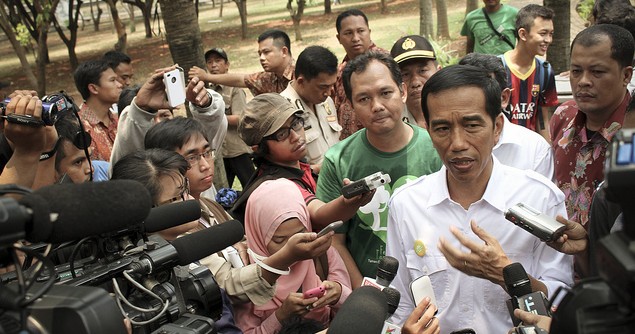Indonesian President Introduces His “Work Cabinet”

The composition of Joko “Jokowi” Widodo’s new cabinet suggests that political patronage had a role in the selection of government ministers.
After several days of speculation and delay, Jokowi announced the members of his cabinet (named Kabinet Kerja or “Cabinet Work”) on 26 October 2014. A week earlier, on the day of his inauguration, he indicated that the announcement would be made no more than two days later. The delay is thought to have been caused by the leaders of political allies nominating problematic candidates.
These candidates did not fit the profile of the ministers in the leaner, professional cabinet composed of 18 technocrats and 16 professionals from political parties Jokowi promised to construct during his election campaign.
Throughout his first week in the presidential office, Jokowi made several visits to the house of PDI-P Chairperson and former Indonesian President, Megawati Soekarnoputri. The frequency of his visits suggests that the president had limited authority over the choice of his own cabinet ministers. In a statement that possibly indicates where political power truly lies, Tjahjo Kumolo, the new Minister for Home Affairs, stated, ‘I want to go meet the boss, to report to her [Megawati].’
During his campaign Jokowi promised that the number of political appointees in his 34-person cabinet would be limited to 16. A total of 21 ministers either have political affiliations with the Indonesian Democratic Party of Struggle (PDI-P), are members of one of the political parties within the Great Indonesia Coalition (KIH) supporting Jokowi, or have links to a key political figure within the KIH.
There are several glaring examples of political patronage in the composition of the cabinet, the most prominent being the country’s new Co-ordinating Minister for Human Development and Culture, Puan Maharani. Puan is the daughter of Megawati and has no experience of running a government ministry or agency. As a co-ordinating minister, however, she oversees several ministries within her portfolio, most importantly the Ministries of Religious Affairs, Health, Education and Social Affairs.
Another prominent appointee who is obviously the product of political patronage is Defence Minister, Ryamizard Ryacudu. He was involved in the Indonesian invasion of East Timor and also in military operations against the Free Aceh Movement (GAM) and the Free Papua Organisation (OPM) separatist movements. Due to his involvement in these operations his human rights record is controversial, making him a contentious choice for Jokowi. It is likely that he too was nominated by Megawati.
In what could be a promising development for Australia, however, the country’s new Foreign Minister, Retno Lestari Priansari Marsudi, spent several years as a diplomat in the Indonesian Embassy in Canberra. Prior to becoming Foreign Minister, she was the Indonesian Ambassador to the Netherlands. She was also the Director of Inter-Regional Cooperation with America and Europe within the Indonesian Foreign Ministry. Her previous diplomatic postings could indicate that the Jokowi administration is keen to develop closer ties with the West. The appointment of a career diplomat to the position suggests that the Jokowi administration may be more active in the international sphere than was first imagined.
Jokowi also created a new Coordinating Ministry for Maritime Affairs after indicating that he wished to make maritime policy a focus of his administration. The new co-ordinating minister in this ministry, Indroyono Soesilo, has held government positions relating to maritime issues in the past. These positions have mostly related to sea and fisheries research, suggesting that the new administration is serious about further developing the archipelago’s maritime economic potential.
The cabinet announced by Jokowi earlier this week shows that significant political compromises were made. Megawati’s daughter Puan is an obvious product of political patronage and several other members of the cabinet are seen to be close to the PDI-P chairperson. The structure of his cabinet suggests that Jokowi’s administration will most probably continue to have to compromise with the former president.
Mervyn Piesse is a Research Analyst in the Indian Ocean Research Programme at Future Directions International.


